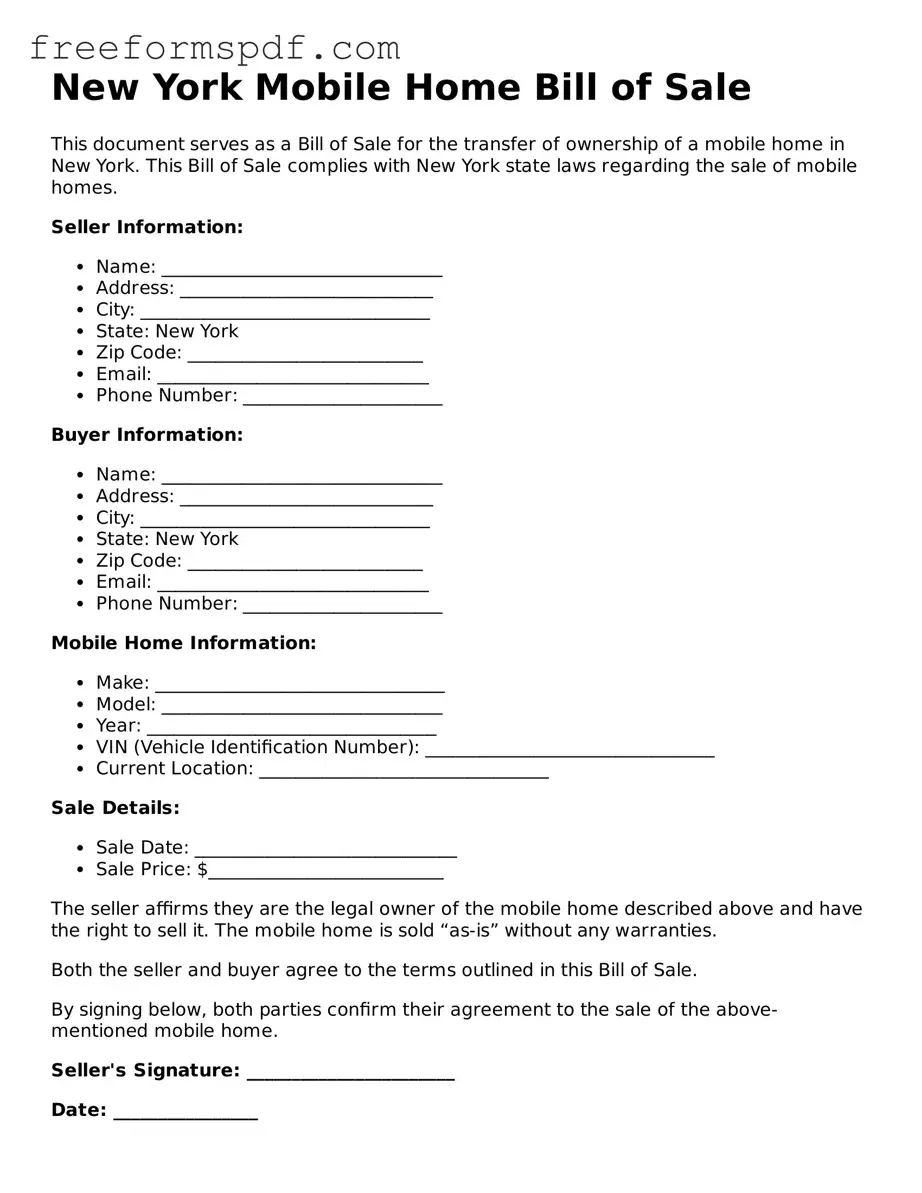Attorney-Verified Mobile Home Bill of Sale Document for New York State
Common mistakes
-
Incomplete Information: One common mistake is failing to provide all necessary details. Buyers and sellers must include their full names, addresses, and contact information. Additionally, the mobile home’s make, model, year, and identification number should be accurately listed. Missing any of this information can lead to complications later on.
-
Incorrect Signatures: Both parties must sign the form to validate the transaction. Sometimes, individuals forget to sign or use a name that does not match their legal identification. This oversight can cause issues with ownership transfer and may require additional steps to resolve.
-
Failure to Notarize: In New York, it is often recommended to have the bill of sale notarized. Some individuals neglect this step, thinking it is unnecessary. However, notarization provides an extra layer of protection for both parties and can prevent disputes regarding the sale.
-
Omitting Payment Details: Clearly stating the sale price and payment method is crucial. Some people forget to include this information or provide vague descriptions. This omission can lead to misunderstandings about the terms of the sale and may complicate future transactions.
Learn More on This Form
-
What is a Mobile Home Bill of Sale?
A Mobile Home Bill of Sale is a legal document that records the transfer of ownership of a mobile home from one party to another. This form provides essential details about the transaction, including the buyer's and seller's information, the mobile home's identification details, and the sale price. It serves as proof of ownership and can be important for registration and titling purposes.
-
Why is a Mobile Home Bill of Sale important?
This document is crucial for several reasons. First, it protects both the buyer and the seller by clearly outlining the terms of the sale. Second, it provides legal evidence of the transaction, which may be necessary for future disputes or issues related to ownership. Lastly, it is often required by state authorities for registering the mobile home with the Department of Motor Vehicles (DMV) or local housing agencies.
-
What information is required on the Mobile Home Bill of Sale?
The form typically requires the following information:
- Full names and addresses of both the seller and the buyer
- Details of the mobile home, including make, model, year, and Vehicle Identification Number (VIN)
- Sale price and payment method
- Date of the transaction
Providing accurate and complete information is essential to ensure a smooth transfer of ownership.
-
Do I need to have the Mobile Home Bill of Sale notarized?
In New York, notarization is not typically required for a Mobile Home Bill of Sale. However, having the document notarized can add an extra layer of security and legitimacy to the transaction. It may also be beneficial in case of future disputes. Always check with local regulations or consult a legal professional if unsure.
Misconceptions
The New York Mobile Home Bill of Sale form is often misunderstood. Misconceptions can lead to confusion for both buyers and sellers. Here are six common misconceptions about this important document.
- The form is only necessary for new mobile homes. Many people believe that a Bill of Sale is only required for new mobile home transactions. In reality, it is essential for both new and used mobile homes to establish ownership and protect the rights of both parties.
- A verbal agreement is sufficient. Some individuals think that a verbal agreement between the buyer and seller is enough. However, having a written Bill of Sale is crucial. It provides clear documentation of the transaction and can prevent disputes in the future.
- The form does not need to be notarized. There is a misconception that notarization is not necessary for the Bill of Sale. While notarization is not always required, it can add an extra layer of authenticity and security to the document.
- The form is only for private sales. Many people assume that the Bill of Sale is only used in private transactions. This is incorrect. The form can also be utilized in sales involving dealers or other businesses, ensuring that all parties have a record of the transaction.
- Once the form is signed, the transaction is complete. Some individuals believe that signing the Bill of Sale finalizes the transaction. While it is an important step, buyers should also ensure that they receive the title and any other necessary documents to complete the transfer of ownership.
- The form is the same as a title transfer. There is often confusion between the Bill of Sale and the title transfer process. The Bill of Sale serves as proof of purchase, while the title transfer is a separate legal process that officially changes ownership in the state’s records.
Understanding these misconceptions can help ensure a smoother transaction process for everyone involved. Proper documentation is key in mobile home sales, and being informed is the first step toward a successful experience.
Some Other Mobile Home Bill of Sale State Templates
Manufactured Home Transfer of Ownership - Improves the transparency of the sale process.
Free Printable Bill of Sale for Mobile Home - Can include agreements on future inspections or repairs.
How to Sell My Mobile Home - Promotes accountability for both the seller and buyer throughout the sale process.
The Employment Verification form is fundamental for professionals seeking to validate employment details. It is crucial in various scenarios, such as obtaining loans and conducting background checks. To explore a wide range of templates that simplify this process, consider utilizing our essential Employment Verification forms available for your needs.
Printable Simple Mobile Home Purchase Agreement - Clear and concise format for documenting the sale.
